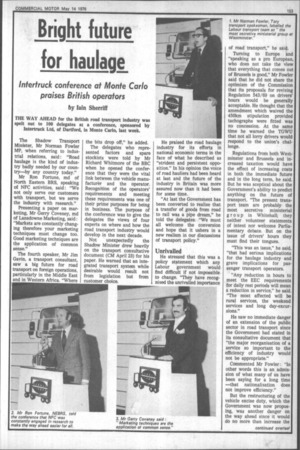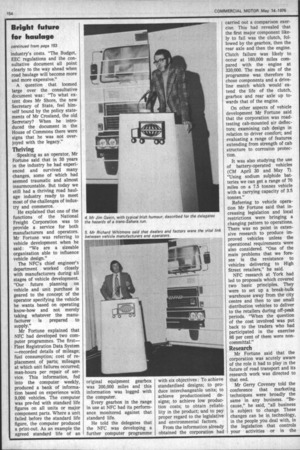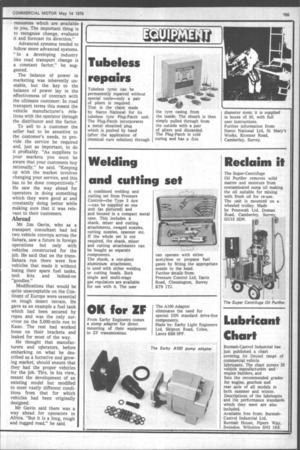Bright future for haulage
Page 155

Page 156

Page 157

If you've noticed an error in this article please click here to report it so we can fix it.
Inter truck conference at Monte Carlo praises British operators
by Lain Sherriff
THE WAY AHEAD for the British road transport industry was spelt out to 100 delegates at a conference, sponsored by Intertruck Ltd, of Dartford, in Monte Carlo, last week.
The Shadow Transport Minister, Mr Norman Fowler MP, when referring to industrial relations, said: "Road haulage is the kind of industry badly needed by our country—by any country today."
Mr Ron Fortune, md of North Eastern BRS, speaking of NFC activities, said: "We not only serve our customers with transport, but we serve the industry with research."
Presenting a paper on marketing, Mr Gerry Coveney, md of Lansdowne Marketing, said: "Markets are constantly changing therefore your marketing techniques must change too. Good marketing techniques are the application of common sense."
The fourth speaker, Mr Jim Gavin, a transport consultant, saw a big future for road transport on foreign operations, particularly in the Middle East and in Western Africa. "Where the bits drop off," he added.
The delegates who represented factors and spare stockists were told by Mr Richard Whitmore of the BBC when he opened the conference that they were the vital link between the vehicle manufacturer and the operator. Recognition of the operators' requirements and meeting these requirements was one of their prime purposes for being in business. The purpose of the conference was to give the delegates the views of four experts on where and how the road transport industry would develop in the next decade.
Not unexpectedly the Shadow Minister drew heavily on the transport consultative document (CM April 23) for his paper. He warned that an integrated transport system while desirable would result not from legislation but from customer choice. He praised the road haulage industry for its efforts in national economic terms in the face of what he described as "strident and persistent opposition." In his opinion the voice of road hauliers had been heard at last and the future of the industry in Britain was more assured now than it had been for some time.
"At last the Government has been converted to realise that a transfer of goods from road to rail was a pipe dream," he told the delegates. "We must all welcome the conversion and hope that it ushers in a new realism in our discussions of transport policy."
Unrivalled
He stressed that this was a policy statement which any Labour government would find difficult if not impossible to change. "They have recognised the unrivalled importance of road transport," he said.
Turning to Europe and "speaking as a pro European, who does not take the view that everything that comes out of Brussels is good," Mr Fowler said that he did not share the optimism of the Commission that its proposals for revising Regulation 543/69 on drivers' hours would be generally acceptable. He thought that the amendment which waived the 450km stipulation provided tachographs were fitted was no concession. At the same time he warned the TGWU that not all lorry drivers would respond to the union's challenge.
Regulations from both Westminster and Brussels and increased taxation would have the effect of increasing costs in both the immediate future and in the long term, he said. But he was sceptical about the Government's ability to predict anything on the future of transport. "The present transport team are probably the most secretive ministerial group in Whitehall; they neither volunteer statements of intent nor welcome Parliamentary debate. But on the issue of drivers' hours they must find their tongues.
"This was an issue," he said, "that had serious implications for the haulage industry and grave implications for passenger transport operators.
"Any reduction in hours to meet the EEC requirements for daily rest periods will mean a reduction in service," he said. "The most affected will be rural services, the weekend services and long day-excursions."
He saw no immediate danger of an extension of the public sector in road transport since the Government had stated in its consultative document that "the major reorganisation of a service so important to the efficiency of industry would not be appropriate."
Commented Mr Fowler : "In other words this is an admission of what many of us have been saying for a long time —that nationalisation does not improve efficiency."
But the restructuring of the vehicle excise duty, which the Government was now proposing, was another danger on the way ahead since it would do no more than increase the industry's costs. "The Budget, EEC regulations and the consultative document all point clearly to the way ahead when road haulage will become more and more expensive."
A question that loomed large over the consultative document was : "To what extent does Mr Shore, the new Secretary of State, feel himself bound by the policy statements of Mr Crosland, the old Secretary? When he introduced the document in the House of Commons there were signs that he was not overjoyed with the legacy."
Thriving
Speaking as an operator, Mr Fortune said that in 30 years in the industry he had experienced and survived many changes, some of which had seemed traumatic and almost insurmountable. But today we still had a thriving road haulage industry ready to meet most of the challenges of industry and commerce.
He explained that one of the functions of the National Freight Corporation was to provide a service for both manufacturers and operators.
Mr Fortune was referring to vehicle development when he said: "We are a sizeable organisation able to influence vehicle design."
The NFC's chief engineer's department worked closely with manufacturers during all stages of vehicle development. "Our future planning on vehicle and unit purchase is geared to the concept of the operator specifying the vehicle he wants based on operating know-how and not merely taking whatever the manufacturer is prepared to supply."
Mr Fortune explained that NFC had developed two computer programmes. The first— Fleet Registration Data System —recorded details of mileage; fuel consumption; cost of replacement of parts; mileages at which unit failures occurred; man-hours per repair of service. This information, fed into the computer weekly, produced a bank of information based on experience with 9,000 vehicles. The computer was pre-fed with standard life figures on all units or major component parts. Where a unit failed before the standard life figure, the computer produced a print-out. As an example the agreed standard life of an original equipment gearbox was 200,000 miles and this information was logged with the computer.
Every gearbox in the range in use at NFC had its performance monitored against that standard life.
He told the delegates that the NFC was developing a further computer programme with six objectives : To achieve standardised designs; to produce interchangeable units; to achieve production i s ed designs; to achieve low production costs; to obtain reliability in the product; and to pay proper regard to the legislative and environmental factors.
From the information already obtained the corporation had carried out a comparison exercise. This had revealed that the first major component likely to fail was the clutch, followed by the gearbox, then the rear axle and then the engine. Clutch failure was likely to occur at 160,000 miles compared with the engine at 320,000. The main aim of the programme was therefore to chose components and a driveline match which would extend the life of the clutch, gearbox and rear axle up towards that of the engine.
On other aspects of vehicle development Mr Fortune said that the corporation was road testing cab-mounted air deflectors; examining cab design in relation to driver comfort; and evaluating a range of features extending from strength of cab structure to corrosion protection.
It was also studying the use of battery-operated vehicles (CM April 30 and May 7).
"Using sodium sulphide batteries we can get a range of 70 miles on a 7.5 tonnes vehicle with a carrying capacity of 3.5 tonnes."
Referring to vehicle operation Mr Fortune said that in creasing legislation and local restrictions were bringing a changing pattern to operations.
There was no point in exten sive research to produce improved vehicles unless the operational requirements were also considered. "One of the main problems that we fore see is the resistance to vehicles delivering to High Street retailers," he said.
NFC research at York had led to proposals which covered two basic principles. They were to set up a break-bulk warehouse away from the city centre and then to use small distribution vehicles to deliver to the retailers during off-peak periods. "When the question of the cost involved was put back to the traders who had participated in the exercise 86 per cent of them were noncommittal."
Research
Mr Fortune said that the corporation was acutely aware of the role it had to play in the future of road transport and its research work was directed to that end.
Mr Gerry Coveney told the conference that marketing techniques were broadly the same in any business. "Because," he said, "all business is subject to change. These changes can be in technology, in the people you deal with, in the legislation that controls your activities or in the resources which are available to you. The important thing is to recognise change, evaluate it and forecast its direction."
Advanced systems tended to follow more advanced systems. 'In a developing industry like road transport change is a constant factor," he suggested.
The balance of power in marketing was inherently unstable, but the key to the balance of power lay in the effectiveness of contract with the ultimate customer. In road transport terms this meant the vehicle manufacturer's relations with the operator through the distributor and the factor.
To sell to a customer the seller had to be sensitive to the customer's needs, to provide the service he required and, just as important, to do it profitably. "As suppliers to your markets you must be aware that your customers buy rationally," he said. "Keeping up with the market involves changing your service, and this has to be done competitively." He saw the way ahead for operators in doing something which they were good at and constantly doing better while making sure that it was relevant to their customers.
Abroad
Mr Jim Gavin, who as a transport consultant had led two vehicle convoys across the Sahara, saw a future in foreign operations but only with vehicles constructed for the job. He said that on the transSahara run there were few vehicles that made it without losing their spare fuel tanks, tool kits and bolted-on "goodies."
Modifications that would be quite unacceptable on the Continent of Europe were essential on rough desert terrain. He gave as an example a fuel tank which had been secured by ropes and was the only survivor on the 5,000-mile run to Kano. The rest had worked loose on their brackets and leaked for most of the way.
He thought that manufacturers and operators, before embarking on what he described as a lucrative and growing market, should ensure that they had the proper vehicles for the job. This, in his view, meant the development of an existing model but modified to meet vastly different conditions from that for which vehicles had been originally designed.
Mr Gavin said there was a way ahead for operators in Africa. "But it is a long, rough and rugged road," he said.




























































































































































































































